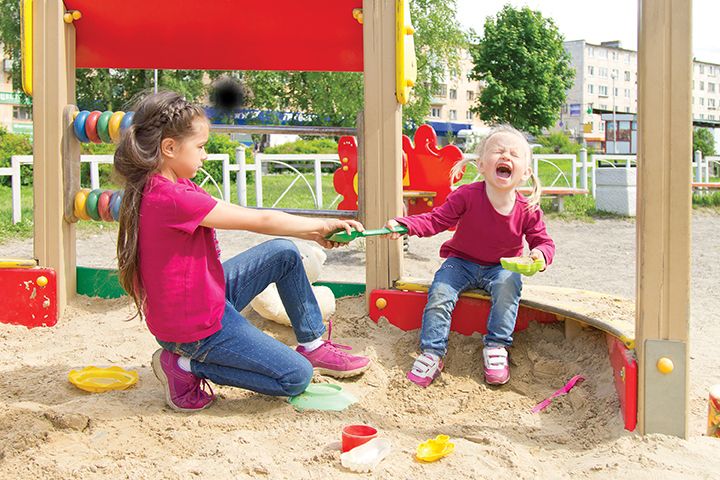First, don’t worry. Kids not sharing is part of a normal and healthy development. And we have 4 simple tips that will encourage your kid to share.
Sharing starts as a fun back and forth game between a parent and child, and babies and toddlers often enjoy this kind of interaction. As children grow older, they become more conscious of what is theirs and what isn’t. This is a natural part of their growing awareness of self and identity, and it gives them a powerful sense of ownership: “It’s mine!”
Sometimes this sense of ownership extends to things belonging to other children, which is awkward. But this can also be part of the learning process as they begin to differentiate between what belongs to them and what belongs to someone else.
To a young child, if they want to play with it, or if it looks nice, it’s theirs! And if someone else plays with it, they are frightened that they will never get it back. So it is helpful for you to intervene. Reassure your child that the toy will always be theirs and they will be able to play with it again soon. Sharing is not the same as giving away. When they share with other children, it encourages other children to share too.
The good news is that if you keep encouraging sharing as a positive value in your home, they will grow back into it. Until then, there are some things you can do to help.
1. Model sharing
Share something with your child as often as you can: a small piece of food that they like, a sip of your juice or a lick of your ice-cream. When you do so, encourage them to share some of their food or drink with you. Thank them for sharing, smile, let them know it is fun and kind to share. Make sharing like this a little game or even a mealtime ritual.
2. Notice
When they share things well or when they give things away, let them know that they are being kind and generous. They are sharing when they draw a picture and give it to you. Or when they help bake biscuits to share with their friends.
3. Don’t punish or shame . . .
your child for not sharing, because they could learn to associate negative feelings with sharing and this can discourage them from sharing later. Acknowledge their distress, comfort their sadness and, when they are calmer, redirect them to another interesting toy. Say things like, “You really wanted to play with that toy, didn’t you? And it is sad when you can’t play with your toy right away. I understand that. You are being very kind to share and let Poppy play with it for a little while. When she has finished playing she will give it back to you because it is yours. Let’s have a cuddle and then find something else fun to play with.”
4. Keep a box of toys that are not “hers”
Call them “sharing toys” and bring this box out when other children come to play. Fill it with pairs of toys, so each child can have the same toy at the same time, and other toys that are naturally shared, such as a ball game for the garden, table and floor games suitable for small children, musical instruments, play food for making tea together, plastic building blocks or a large wooden trainset. Or play outside with a climbing frame, paddling pool or play house. Craft and cooking activities can help children enjoy time together without fighting over toys. Or meet up with other children and parents in a toddler playground, where there are plenty of things to play on that don’t belong to anyone.
If two children want to play with the same toy, use a timer and encourage them to swap toys or find a new toy whenever the buzzer rings. This makes sharing more of a game.
If you have more than one child, it can be helpful to have some toys that are “our” toys that belong to everyone, as well as special toys that belong to one person and can be kept safely hidden in their room if other children come to play.
Most children will naturally learn to enjoy sharing again, partly because they will grow beyond this stage and be able to understand other children’s feelings, but also because you value sharing and you are their role model. Eventually, they will be motivated by making other people happy and then you will be able to encourage their generous spirit, help them make things to give away to others and watch them share with joy.
Any advice given is general in nature and is not intended as a substitute for medical advice and must not be relied upon as such. For any healthcare advice, always consult a healthcare practitioner.
How helpful was this article?
Click on a star to rate it!
0 / 5. 0
Be the first to rate this post!
Karen Holford
Related posts
Subscribe
Receive personalised articles from experts and wellness inspiration weekly!

